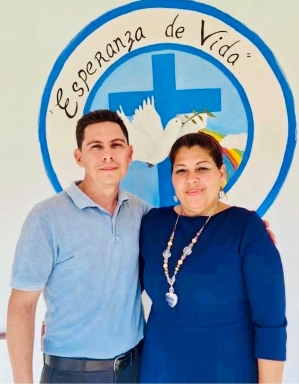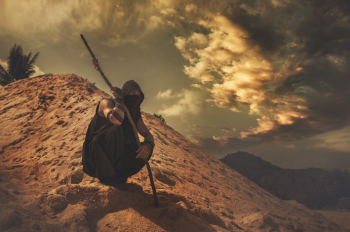
Prosecutors in Cuba seek to imprison a pastoral couple for eight years for mentioning God at a military tribunal for their son, amid a new report showing a continuing trend of increased oppression in the island country.
Pastors Luis Guillermo Borjas and Roxana Rojas of the Assemblies of God were detained on May 19, charged with disrespecting and disobeying authorities. They had testified in the military tribunal of their son, Kevin Laureido Rojas, accused of fleeing a military facility after he was taken by force for the service required of Cuban males at the age of 18 despite having a medical exemption, according to advocacy group Christian Solidarity Worldwide (CSW).
When the couple presented documents from a medical commission showing a psychiatric condition made their son unable to perform military service, the military prosecutor accused the couple of lying and presenting false evidence.
“Pastor Borjas protested, stating that the officials in the court would be accountable to ‘God’s justice,’” CSW reported. “The prosecutor then ordered the couple to be detained and charged, claiming that it is illegal to mention God or God’s justice in a military tribunal.”
The prosecutor seeks a prison term of eight years for the charge. The denomination of the couple, who live Nueva Gerona on Isla de la Juventud, has legal status in Cuba. Their trial is scheduled for June 9.
Cuba committed 1,988 violations of religious freedom in 624 cases in 2024 as part of a trend of increasing oppression that began in 2021, according to a new report by CSW.
The results included shutting down churches, fining pastors and confiscating properties, according to the report, released on Thursday (May 29).
“The government continued to monitor religious activities overtly and covertly through the use of informants and harassed religious leaders based on their reports,” states the report, entitled, “No Respite: The Systematic Suppression of Freedom of Religion or Belief in Cuba.”
In one case, Committee for the Defense of the Revolution (CDR) officials in May 2024 organized an “Accountability Assembly” in front of the home of a pastor of an unregistered church in central Cuba.
“Neighbors were invited to participate in an organized ‘discussion’ about the dissolution of the pastor’s church,” the report states. “The pastor and his wife refused to go outside to participate but listened as the CDR officials urged members of the community to distance themselves from the pastor’s church and the network to which it belongs, claiming that they were counter-revolutionary and responsible for causing public disturbances.”
The CDR officials told residents of government efforts to monitor and stop “anti-government” elements in the community.
“The church subsequently shut down,” the report states, “and the pastor told CSW, ‘This was nothing more than a disguised act of repudiation. With these comments, the delegates tried to discredit the pastoral work we do by slandering us. We may never be able to open another congregation.’”
In another case in central Cuba, an inspector from the National Revolutionary Police (PNR) on Feb. 18, 2024 objected to a registered church’s prayer the prior night against abuse and mistreatment of women, including prayer for women and Cuba in general.
“The PNR inspector warned the pastor that the pastor was promoting ‘wrong ideas,’ encouraging anti-government sentiment and inciting the community to counter-revolution and ordered him not to hold any more vigils or to pray for any kind of change in Cuba,” the report states.
The pastor was fined 15,000 Cuban Pesos ($600 USD) and threatened with imprisonment if he disobeyed the order.
In one alarming case, a man attacked a church leader during a church service with impunity, the report notes. Bishop Jorge Luis Pérez of the Alliance of Christians of Cuba, an unregistered, cross-denominational network of religious leaders, was leading the Ministerio Pentecostal Rehobot Church of the Orthodox Church of God on July 7 when a young man apparently under the influence of drugs approached him holding a machete.
“The young man struck Bishop Pérez on his back with the blunt side of the weapon before members of the church subdued him and called the PNR,” the report states. “Despite taking testimony from those on the scene, the young man was released from police custody only a short while later. No charges were filed.”
Pérez told CSW, “It is difficult to describe the discomfort I felt when I saw how state security granted immunity to this young man who attacked me, without filing a single charge against him. This is discrimination against me, since a similar attack on any other citizen would have been severely punished. This incident sets a dangerous precedent, inviting criminals to intimidate our community of believers.”
The bishop said his membership in the Alliance of Christians of Cuba and the social assistance projects they undertake prompted the assault.
“The message is clear: they will do nothing against those who commit acts of violence against us,” he said. “I truly fear for my life and for that of our congregants.”
Officials prevented those it considers to be dissidents and their family members from attending religious activities, part of a long-standing policy of socially isolating those critical of the government. The government especially targeted the Ladies in White group, systematically stopping members of the Catholic movement from attending Mass across the island.
While most cases involved detaining the women as they left their homes for a few hours until Mass ended, many were made to stay, sometimes handcuffed, in police vehicles parked in the tropical sun with windows closed, and then they were dropped off in remote locations, forced to make their own way back to their homes. Berta Soler Fernández and her husband Angel Moya were regularly singled out for more severe treatment.
“Their home, which also serves as the civil society organization’s headquarters, was regularly surrounded by organized mobs, some holding signs with offensive and insulting messages and recording the couple’s movements on mobile phones,” the report states. “They were arbitrarily detained at around midday most Sundays, almost immediately after leaving their home to attend Mass.”
Department of State Security (DSE) agents in most cases took the couple to a PNR station, sometimes separately, where they ordered them to undergo intrusive medical examinations, which they consistently refused, the report states. Held in separate prisons overnight and fined, they were sometimes told to sign Actas de Advertencia – a pre-arrest warrant to justify future arrest should they commit specified crimes – which they refused to do.
“Their treatment and the conditions in which they were held were inhumane,” CSW reports, stating that Fernández “was sometimes denied water and on one occasion was ordered to disrobe and squat in front of prison guards. Mr. Moya was not allowed to wear anything on his feet, including flip-flops, exposing his skin to the highly unhygienic prison cell floor. On one occasion, a DSE officer ordered guards to knock him down onto the floor. One of the guards pushed his knee into Mr. Moya’s back, while another bent Mr. Moya’s right leg and twisted his ankle. His arms were pulled tight behind his back, causing lacerations and inflammation in his wrists.”
Authorities threatened and pressured religious leaders, and children were subjected to physical and verbal abuse at school because of their religious beliefs, the report notes.
“Leaders of unregistered religious groups were repeatedly harassed and threatened, while leaders of registered religious groups were targeted with intrusive surveillance, repeat interrogations and other pressure tactics,” it states. “CSW noted an uptick in the application of fines on religious leaders, generally for leading unauthorized religious activities, holding religious activities in locations not approved for religious use, or both.”
Authorities appeared especially intent on targeting religious leaders and individuals who offered spiritual or material support to families of political prisoners, according to the report. Churches responding to humanitarian needs, which grew sharper in many parts of the island last year, were harassed and fined.
“In many cases, the aid they were attempting to distribute was confiscated,” the report states. “Those considered by the government to be dissidents were repeatedly and systematically blocked from attending religious services, usually through short-term arbitrary detention.”
Though officials tried to silence critical voices, religious leaders from both registered and unregistered groups continued to report and speak publicly about Freedom of Religion or Belief and other human rights violations, the report notes
“While some Cubans, no doubt, are more cautious and many have seen no other option than to go into exile, there remain many who, even in the face of threats, harassment and the possibility of imprisonment, continue to speak out against injustice and up for those in their communities who are suffering,” CSW states.
Cuban ranked 26th on Open Doors’ 2025 World Watch List of the countries where it is most difficult to be a Christian.





